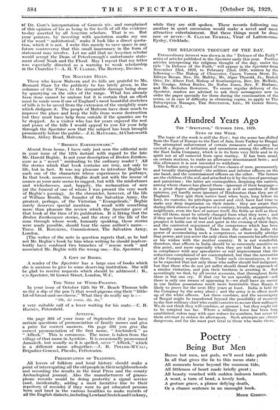A Hundred Years Ago
THE " SPECTATOR," OCTOBER 24.ru, 1829.
NEWS OF THE WEEK.
The topic of the week is still the East; but the scene has shifted from the East of Europe to the East of Asia, from Turkey to Bengal. The attempted enforcement of certain measures of economy has excited a degree of irritation and uneasiness among the officers of the East India Company, which is in its form very little and in its spirit not at all removed from open mutiny. It has been usual, on certain stations, to make an allowance denominated batta ; and this allowance it is now intended to withdraw.
The Indian army is composed of two classes of men, permanently and broadly distinguished—the soldiers and inferior officers on the one hand, and the commissioned officers on the other. The former are the children of the soil, and attached to it by the ties of parentage and patriotism • the latter are cosmopolites, despising the natives, among whom chance has placed them—ignorant of their language— in a great degree altogether ignorant as well as careless of their opinions, yet hardly more ignorant of Rindoostan than they are of England. They quit their native land when boys, long before its laws, its customs, its privileges sacred and civil, have had time to make any deep impression on their minds : they are aware that during their absence of a quarter of a century, friends, acquaintances, neighbours, even the face of nature itself, the fields as well as those who till them, must be utterly changed from what they were ; and if they are bound to the land of their fathers at all, it is only by the prospect it holds out of rest and quiet in the evening of their days, and the contented enjoyment of the competence which has been so hardly earned in India. Take from the officer in India the power of accumulating such a competence, or materially abridge that power, and you sever the only chain that connects his affections or his wishes with the mother country. It is not wonderful, therefore, that officers in India should be so extremely sensitive on this point, and more especially when they are told that it is not in compliance with any speculative or real improvement that the reductions complained of are contemplated, but that the necessities of the Company require them. Under such circumstances, it was to be expected that not only those who suffer should feel indignant, but that those who do not yet suffer should dread the approach of a similar visitation, and join their brethren in averting it. And accordingly we find, by all recent accounts, that throughout India there is but one cry. If that cry be not speedily stopped—arid there is only one means of appeasing it—we shall have an enemy in our Indian possessions much more formidable than Russia is likely to prove for the next fifty years at least. India is held for the Company by the army alone ; and the army is in effect made up of the white officers. Let these combine, and the sovereignty of Bengal might be transferred beyond the possibility of recovery to the first military chief who could contrive to secure their suffrages. We do not think they will combine, at present ; but they ought not to be tempted too far. Where a military force has been long established, rulers may with ease reduce its numbers, but never let them attempt to reduce its allowances. Such attempts are always dangerous, and for the most part fatal to those who make them.


















































 Previous page
Previous page